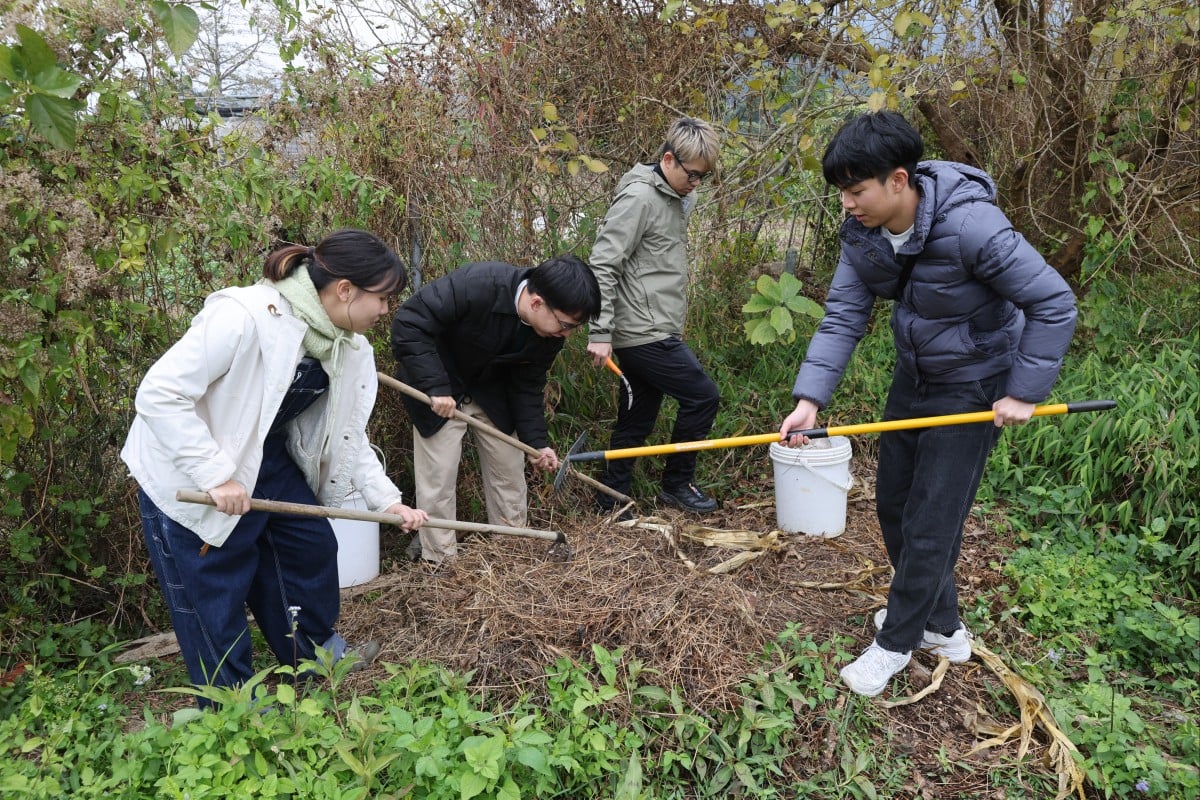
Grass-roots green living: Lingnan University students empower communities towards sustainable waste practices
- In this service learning course, students collect food waste from stalls and shops in Hong Kong, bring it to farms to compost and educate the public about sustainability
- Every week, Talking Points gives you a worksheet to practise your reading comprehension with exercises about the story we’ve written
 Timmy Sum (second from left) and Daren Leung (third from left) layer food scraps with carbon-rich materials in a process called hot composting. Photo: Edmond So
Timmy Sum (second from left) and Daren Leung (third from left) layer food scraps with carbon-rich materials in a process called hot composting. Photo: Edmond SoWithin an hour at Tai Po market, a group of Lingnan University students salvaged 86kg of food waste from vendors.
From coffee grounds and sugar cane pulp to “ugly” produce, these items would typically have ended up in landfills. But thanks to this initiative, the “ugly” produce was distributed to those in need, while the other food waste went to farms for composting.
At one of the project’s partner farms, Pioneer Farm in Yuen Long, other students helped with the hot composting process, which decomposes the food scraps and transforms them into nutrient-rich fertiliser.
Foodlink Foundation works on reducing food waste and hunger in Hong Kong
These 30 students were part of a service learning practicum led by Daren Leung Shi-chi, a research assistant professor at Lingnan University. The course is supported by Leung’s NGO, Day Day Waste-Wise, which he co-founded with Lab0ver, a local group dedicated to establishing a community network for food waste recycling in Hong Kong.
“This experience is a shocking lesson for the students ... They never imagined that collecting such a substantial amount of surplus food could be so easy,” explained Leung, who is in his 30s.
“Witnessing the scale of food waste, they realised the severity of Hong Kong’s food waste problem.”
Hong Kong teens aim to tackle food waste with their invention, Easy Car
Each semester since the course began in 2022, Leung’s class is divided into groups for farming, community work, and event organising. Students from other universities can also join.
“The students understood that many kaifong were not indifferent to the issue of food waste,” he noted, adding that these everyday people had few chances to discuss the difficulty of sustainable waste management.
“I wanted to ... involve my students in the community, wet markets, and restaurants. I wanted them to learn how to handle food waste first-hand,” the professor said.
The benefits of service learning
In 2022, about 11,130 tonnes of municipal solid waste (MSW) ended up in Hong Kong’s landfills each day; with food waste accounting for around 3,300 tonnes daily, it is the largest category of MSW. To tackle this, the city has introduced food recycling bins, though many of them are inaccessible to most residents.
Translation student Mabel Wong, 21, shared how this service learning practicum opened her eyes to the pressing issue of food waste while fostering her connection with the local community.
“I witnessed how many perfectly edible ‘ugly’ fruits were discarded,” said the fourth-year student.
“This has changed the way I think about my future ... Originally, I was interested in social work, but now I’m considering becoming a campaigner.”
‘Ugly’ produce, fan economy: students’ reports on Hong Kong consumer culture
Another student participant, Logan Wang, 23, highlighted how some shops could not sign up for the food waste recycling initiative as they lacked space to store the scraps while waiting for them to be picked up.
“They have good intentions but lack the means. Collecting food waste daily poses challenges for us as not all farms can accommodate them,” Wang explained.
Brian Lam, a third-year sociology student, suggested a way to incentivise the public to recycle: “Implement a point system for recycling food waste or plastic items. These points could be redeemed for small gifts ... or exchanged for cultural tours or farm visits. This could gradually develop people’s recycling habits.”
Community-oriented food waste management
Ahead of the start of Hong Kong’s waste-charging scheme in August, some are concerned about the cost of buying the government’s designated rubbish bags.
Timmy Sum Pit-tim – the 23-year-old co-founder of Day Day Waste-Wise and Lab0ver – expressed his disappointment over the government’s levy-driven approach to waste reduction.
Sum explained how this created an incorrect perception of why people should recycle: “The prevailing mindset in Hong Kong is that being environmentally friendly can either bring financial gains or losses – it lacks intrinsic value.”
Instead, he believes there should be more focus on educating the public about the environmental impact of waste, as well as empowering grass-roots recycling initiatives within different communities.
Sum added: “Many existing environmental education programmes can be dull and outdated, focusing only on basic concepts like three-colour recycling. That’s why we wanted to improve the quality of education.”
Face Off: Should we be charged for our household waste?
Leung noted the importance of organisations working together with local communities: “Promoting environmental conservation and waste reduction can be accomplished collectively, rather than individually.”
Thus, the Lingnan University students and Day Day Waste-wise have partnered to organise workshops to educate the public about sustainable waste practices.
Last year, they hosted an activity at Tung Tak School in Tuen Mun. The event for primary school pupils featured interactive workshops on topics, such as how to use leftover food to make pizza, dye fabric with onion skin, and create green compost.
Leung pointed out some of the life lessons that young people could learn from adopting a sustainable lifestyle.
“It shows them that seemingly insignificant ... things can be turned into something useful,” he said. “It also brings people together to create something meaningful, fostering more community participation.”
To test your understanding of this story, download our printable worksheet or answer the questions in the quiz below.
